#a dorothy l sayers mystery
Text
We don't talk enough about the Petherbridge/Walter adaptations of the Wimsey/Vane novels.
(Well, we probably talk EXACTLY enough about Gaudy Night, which is really pretty bad, but besides for that...)
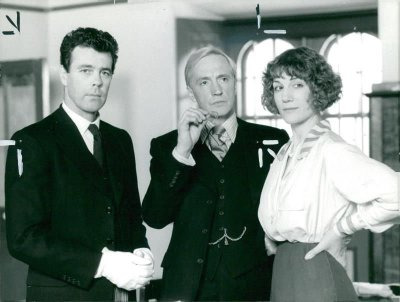
(Sorry, just a warning, Richard Morant as Bunter is fine but I won't have much to say about him here. I just really like this picture.)
The casting is basically perfect, especially Harriet Walter as Harriet Vane. I no longer see the book character in any other way- the only notable difference is that in the book she's noted as having a deep voice, but Walter's has a distinctive enough tone that I think it works regardless. She is just so, so, so good- captures the character beautifully, sells everything she does whether mundane or ridiculous (probably the best/most realistic reaction of someone finding a body I have EVER seen in Have His Carcase), makes the most of every limited minute she's on screen in Strong Poison and leaves her mark every minute that she isn't... and she looks AMAZING doing all of it. Just perfect, could not imagine better casting.
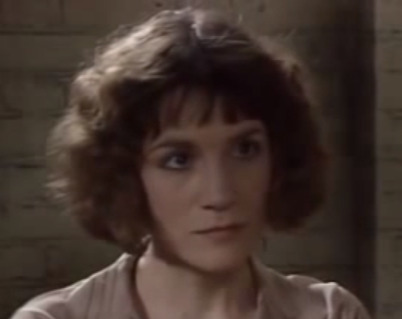
Edward Petherbridge I don't hold up to that level of perfection- I think that, try as he might, he's not really able to capture Wimsey's dynamism (possibly because he's a bit too old for the role) and is a bit overly caricatured in many of his mannerisms. But overall he does a pretty good job, in addition to looking quite a lot like how I'd imagined Wimsey- but in particular, I think he does a really lovely job of selling a lot of the emotion that he has to convey in some scenes that feel like they SHOULDN'T be adaptable from the book- specifically the scenes of him and Harriet. Him proposing to Harriet, him being disappointed when she (completely reasonably) turns him down... those shouldn't work on screen with real humans rather than in Sayers's calculated prose, but it DOES work and in no small part because he's great at selling Wimsey's feelings as being genuine even when his actions seem over the top. And, of course, Harriet Walter sells her end of the scenes right back. All in all, I think I have mixed feelings about Petherbridge as Lord Peter Wimsey the detective, but I'm a fan of him as Peter, the man who has feelings for Harriet.
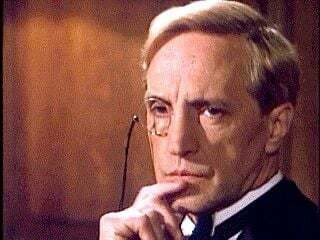
Overall, though, both are, I think, very successful in capturing these characters- the fact that they take these people who even in the book can sometimes push the boundaries of likeability (which to be clear, is part of what I love about reading them) and make them eminently watchable is a great achievement. And also, in addition to their really looking like their characters individually, they're very well matched as a pair in the way that one pictures them from the book. They're even of very similar height and build, which we know is canonically true from Gaudy Night, and thus at least a somewhat relevant element of their dynamic.
Now, the adaptations are very uneven, and that's even without talking about Gaudy Night because, while it has about as good a rendition of the punting scene as I think we were ever going to get, most of the rest of it is crap and massively expands on what I think are serious problems to Peter and Harriet's relationship that the series as a whole had (not to mention cutting the character of St George, which is a travesty). None of the adaptations are perfect, and mess with aspects of their relationship in negative ways- for example, the ending of Strong Poison is exactly backward in a really awful way. I'll get back to this.
But when the show gets the two of them right, it gets them RIGHT, even when it's adapting Sayers's text/creating new dialogue. There are scenes in this one that I love almost as much as the canon text, like this one:
I don't think any of this is in the book, and there are things that happen here that I don't think Sayers would have ever written. But at the same time, a combination of the dialogue and the actors makes it COMPLETELY believable as these two people, and it captures a moment that is just really key for Peter as he faces his limitations and his feelings- something that in the book is conveyed through a lot of internal narrative on Peter's part that would be impossible to adapt as is, but that in the world of the show needed to happen in a much more visual and narrative way. Not all of the dialogue that this series chooses to fill in those gaps works, but even when it doesn't the actors do their best to sell the heck out of it, and when the dialogue DOES work it is seriously brilliant.
Probably my favorite of the adaptations is Have His Carcase, and scenes like this one are a big part of the reason why:
They change the location, but otherwise it's EXTRAORDINARILY faithful to the equivalent scene in the book, and honestly it shouldn't have worked with real people doing it and yet it does. It's just acted perfectly, given just enough arch and silly humor (particularly with the spinning door) that we don't attempt to take it too seriously, while also conveying the relevant emotions so well. The actors in the scene through only their faces and ways of speaking convey subtext that Sayers, in the book, conveyed a lot later on as actual text in the characters' thoughts, and there's something pretty great about that.
Other Have His Carcase scenes are less good (the dance scene is mediocre at best, I think), but if there's another Have His Carcase scene that I think illustrates how great Walter and Petherbridge are at selling the human sides of their characters, it's That Argument- seen here:
The Argument is a pale imitation of that in the book- the one in the book is, in fact, probably unadaptable as is- but it is still just so good because the actors are so good at selling it. Walter is just brilliant in the role and utterly inhabits it while also imbuing it with her own spin, and makes us feel Harriet's pain- and Petherbridge, through some relatively subtle facial expressions and reactions, is able just as well to make US understand what all of this means to him and how he feels. It's actually really remarkable that, just like how Sayers writes a relationship dynamic that only feels like it works because she's the one who wrote it that very specific way, this scene feels like it only works because these two actors play it in this specific way. Could two other actors do it? Very possibly, but it would feel super different and I wonder if it would feel this authentic. (I do want to note though that this scene made me really wish that we'd seen a Frasier-era David Hyde Pierce in the role of a younger and spryer, but equally posh, witty, and vulnerable, Wimsey. It just gave me vibes of something that he'd do beautifully.)
Now, as I said above, this doesn't get EVERYTHING right. In fact, quite a lot of their relationship ends up going pretty wrong- as I think a major mistake is their throughline which emphasizes Peter's continued pursuit of Harriet as not just reiterating his interest to make it clear that he hasn't changed his mind, but actively taking advantage of moments and situations in a romantic sense, taking a much more specific role in engaging with her physically, commenting on her appearance, saying how difficult it is for him to NOT pursue her more, etc. It makes the whole thing feel a lot more cat-and-mouse rather than a budding relationship of equals, and one where Peter acknowledges the whole time that they HAVE to be equals for a) Harriet to feel comfortable with him and b) them to be good together. In fact, however good the Argument above is, it's kind of undercut by this very pattern- he makes the book's point about him treating his feelings like something out of a comic opera, but he also at that point in the story has had a few much more oppressively serious scenes with her that clearly make her uncomfortable- nothing like anything in a comic opera. It's like the show misses the point a little.
I think the place where this really starts is at the end of Strong Poison. (I could see an argument to be made that it starts earlier, in a few smaller nuances of their jailhouse scenes, but I like those enough that I choose not to read into them too much lol.) After what I think is a great addition to the final jailhouse scene (one that I loved so much I repurposed it for a fic)- "it's supposed to be about love, isn't it" and some excellent reactions from Petherbridge- Harriet goes to court, her charges are dismissed, and unlike in the book, when it's Wimsey who leaves first (which Eiluned and Sylvia point out is a sign of his decency in not waiting for Harriet to thank him), here Wimsey is the one who watches as Harriet rejects him and walks away from him- the beginning of the chase. But nothing about their relationship is meant to be a chase! It's so frustrating to watch as that proceeds to be a continuing issue to a limited degree in Have His Carcase (where it's at least balanced by enough good moments that it doesn't matter so much) and to a MASSIVE, genuinely uncomfortable degree in Gaudy Night.
The only praise I will give it is that while the punt scene in the book is unfilmable, I think this adaptation did its best here and it's pretty good.
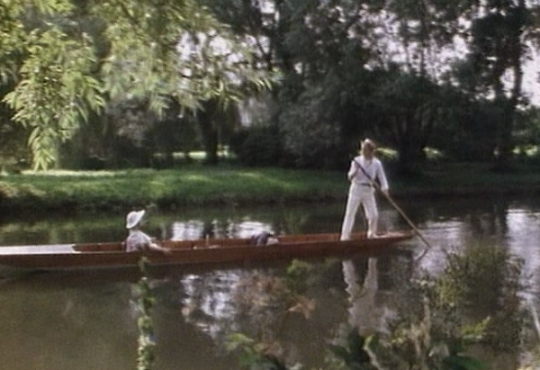
I'm not going to spend much time talking about Gaudy Night otherwise, because I'd need all day for it and also I'd probably need to rewatch it to make sure I get the details right and I have zero interest in doing that, but the way that it has Wimsey imposing himself and his feelings/hopes on Harriet to a really ridiculous degree, in a way that he never, ever does in the book, is just so so discomfiting and makes me feel terrible for Harriet. She doesn't deserve that. If I recall correctly, in that scene at the dance at the beginning, she's so happy just being with him and then he's all "oh so this means you want to marry me" and she just droops. He's so aggressive!
And that's what makes the worst part so bad, because not only does this miniseries not depict Wimsey's apology as the book does- one of the best scenes in a book full of brilliant scenes- it would actually be weird if it did, because this show doesn't imply that there's ANYTHING for Wimsey to be apologizing for! In fact, unlike in the books where we see Wimsey growing and deconstructing the parts of himself that had been demanding of Harriet, in the series we only see him get more demanding- until finally he wins. It's honestly infuriating and I hate it- the actors do their best to sell it (and apparently they were given bad enough material that they actually had to rewrite some of it themselves, though I have mixed feelings about the results) but it is just massively disappointing. Basically the whole emotional journey between the two of them is not just neutered but twisted.
For all of my criticisms of the adaptations' all around approach to their relationship, I do have to reiterate- Walter and Petherbridge do a wonderful, wonderful job. (Especially Walter.) When they're given good material to work with, and even often when they aren't, they are able to sell it so well- and particularly in the case of Walter, I genuinely can't think of the character as anyone but her rendition now. She IS Harriet Vane for me. And, for all the flaws that the series has, that's something pretty dang special.
Anyway, for anyone who read through this whole thing and hasn't seen these adaptations, I DO recommend Strong Poison and Have His Carcase- but not Gaudy Night unless you're either really curious or a glutton for punishment. The first two, though, have very good supporting casts, are quite faithful plot wise (sometimes to a fault- another flaw is that they are really devoted to conveying the whole mystery with all its clues sometimes to the point of dragginess, but will drop sideplots like, for example, Parker and Mary- which is totally reasonable, but still vaguely disappointing as those sideplots tend to add some levity/characterization), and just generally are an overall good time. (Some standout characters for me are Miss Climpson in Strong Poison and Mrs Lefranc in Have His Carcase.) And, of course, the best part is seeing the little snippets of Peter and Harriet that come through- less so their journey, vs in the book where that's central, but so many scenes where we just see the two of them together as they are in that moment and it's so satisfying.
#peter wimsey series#peter wimsey#lord peter wimsey#harriet vane#dorothy l sayers#edward petherbridge#harriet walter#a dorothy l sayers mystery#as was apparently the official title of the petherbridge/walter series#my thanks to the as my wimsey takes me podcast people#for a) coming back and finishing have his carcase#which was very enjoyable plane listening#but also for mentioning the adaptation in one of the episodes and inspiring the rewatch that led to this post#also this blog is basically now a sayers blog just as it is a finnemore one i guess#which as i note is fitting due to my Dog Collar Theory#which is YET ANOTHER THING THAT THE GAUDY NIGHT ADAPTATION LEAVES OUT GRRRRRR#strong poison#have his carcase#gaudy night
38 notes
·
View notes
Text

This really ought to top every “Best Opening Lines,” list. The 21st century reading public is sleeping on Dorothy L Sayers.
(Have His Carcase 1932)
#harriet vane#dorothy l sayers#have his carcase#lord peter wimsey#golden age mystery#authoresses#authors
620 notes
·
View notes
Text
Lucian's Library 3
Feel free to suggest never written books you wish you could read.
Option slightly shaved to fit the format.
#Patrick Rothfuss#The Kingkiller Chronicle#The Sandman#Terry Pratchett#The Mystery of Edwin Drood#Charles Dickens#Hilary Mantel#Shirley Jackson#Elizabeth Gaskell#A Mansfield Park#Jane Austen#Patrick O'Brian#Aubrey–Maturin series#C.S. Lewis#Agamemnon#Dorothy L. Sayers#Lord Peter Wimsey#Kubla Khan#Samuel Taylor Coleridge#Christopher Marlowe#Kit Marlow
240 notes
·
View notes
Text
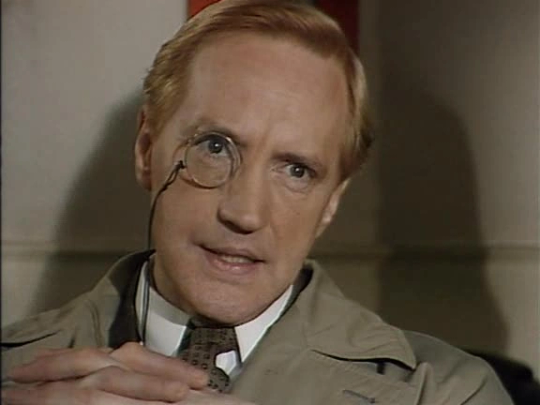
33 notes
·
View notes
Text

Reading on a mostly empty train this evening 💕
#currently reading#booklr#book photography#strong poison#lord peter wimsey#dorothy l. sayers#mystery#krimi#who dunnit
108 notes
·
View notes
Text
A Dorothy Sayers Primer
I initially wrote this for any Shipwrecked fans who loved Honeymoon Homicide and are now curious about Dorothy L. Sayers (the author Sinead named Tracey's fictional detective after) or Busman's Honeymoon (the Sayers novel that the script was inspired by), but it works for anyone who's curious about the Lord Peter Wimsey series! Here's some info to get you started.
For Shipwrecked fans: Busman's Honeymoon is the final book Sayers wrote in the Lord Peter Wimsey series, so unfortunately you can't start there (trust me, it'd be like watching the musical episode of Buffy first). Lucky for you, the whole series is delightful!
The elevator pitch: Lord Peter Wimsey, a wealthy and amusing English aristocrat, solves murders in 1920s and '30s London with his friend Chief Inspector Parker of Scotland Yard and his faithful valet Bunter.
Why you should read it: Highlights of the series include Lord Peter's nonstop literary references (guy was basically an old-timey meme factory) and the fact that, more often than not, the books are about some bigger concept in addition to having a nice tricky mystery to solve. Topics Sayers tackled include everything from the place of women in society to the way countries fail their veterans.
There are three possible ways to read them, depending on your preference.
Read the series in chronological order. The best way, IMO! The first book is Whose Body and it's delightful, but I have heard some people say they found the earlier books harder to get into until after they had read the Harriet books, hence method #2. Admittedly, she develops Peter's character a lot over the course of the series, so the Peter we initially meet has a lot of growing to do.
Read the Harriet Vane books first. About a third of the way through the series, Lord Peter meets a mystery novelist named Harriet Vane, and their relationship is covered over four of the seven books that follow: Strong Poison (book 5), Have His Carcase (book 7), Gaudy Night (book 10), and Busman's Honeymoon (book 11). It is entirely possible to read just these four and feel you've gotten a complete arc.
Read the first book, and if you're not entirely sold, skip ahead to Strong Poison. I was talked into method #2 so I can't knock it, but I usually recommend #3 for people who aren't totally sold on the premise. At least give Whose Body a try, but if you're not feeling it and/or just want to get to the relationship stuff, read the Harriet books and then go back and fill in the gaps as you like.
There you go, more information than you possibly could have wanted! Now you can choose your method and get over to your local library to get started (btw, If you plan to go the audiobook route, I recommend seeking out the versions read by Ian Carmichael).
EXTRA INFORMATION (aka I'm sorry I'm like this)
Content warning: It's the 1920s, so there's gonna be some racism, classism, fatphobia, and sexism. But if you've read Agatha Christie, this is mild by comparison. There are a few slurs and references to stereotypes, but when Sayers writes an actual minority character they're complex, sympathetic human beings. For my fellow Jews, be warned that the victim in Whose Body is Jewish, but it's not a hate crime and the Jewish characters are all cool.
Other works by Sayers: This primer is focused on the Wimsey books because they were her main writing output, and everything else she did kind of requires a caveat or is in a very different vein: she wrote some plays and nonfiction, primarily about Christianity, and a translation of Dante's The Divine Comedy which I understand is very well regarded. Her only other novels were all co-written with other authors, and in my opinion don't feel particularly Sayersesque. If you read all the Wimsey books and collections and want more, The Documents in the Case is decent. I haven't read most of the rest: I am a fan, not an expert!
A full list of the novels and short story collections in order (because I'm a completist, sorry not sorry):
Whose Body (1923)
Clouds of Witness (1926)
Unnatural Death (1927)
* Lord Peter Views the Body (1928) [collection]
The Unpleasantness at the Bellona Club (1928)
Strong Poison (1930)
Five Red Herrings (1931)
Have His Carcase (1932)
Murder Must Advertise (1933)
* Hangman's Holiday (1933) [collection]
The Nine Tailors (1934)
Gaudy Night (1935)
Busman's Honeymoon (1937)
* In the Teeth of the Evidence (1939) [collection]
Posthumous:
Lord Peter (1972) [collection of all the Lord Peter short stories]
Thrones, Dominations (1998) [novel by Jill Paton-Walsh**, using an incomplete manuscript Sayers started for a twelfth Lord Peter book; questionably canon, but worth reading]
The Complete Stories (2002) [collection of all Sayers' short stories]
*The collections are listed in publication order, but the stories therein happen at different periods of Peter's life and can be read any time.
**Paton-Walsh wrote three more Wimsey novels after completing Thrones, Dominations, but they should be viewed purely as fanfic (I personally do not care for them).
#Dorothy L. Sayers#Lord Peter#Lord Peter Wimsey#Shipwrecked Comedy#Honeymoon Homicide#thank you for indulging me#I am a massive Dorothy Sayers fan and it pains me every day that she's so little-known#if you read all these books and still think Agatha Christie is the Queen of Mystery I will pay you $5
43 notes
·
View notes
Text

Currently reading Unnatural Death.
#reading#read#book#booklr#book photography#coffee#coffee mug#photography#photographers on tumblr#original photography#Dorothy L. Sayers#Unnatural Death#Lord Peter Wimsey#mystery
24 notes
·
View notes
Text
I have eighty-two pages of The Nine Tailors left, and I wish I could say I think I know where Ms Sayers is going with this but I do Not lmao
#lord peter wimsey#dorothy l sayers#the nine tailors#this is how i like my mysteries though lol i enjoy just being along for the ride
4 notes
·
View notes
Text
“Do you find it easy to get drunk on words?"
"So easy that, to tell you the truth, I am seldom perfectly sober.”
― Dorothy L. Sayers, Gaudy Night
2 notes
·
View notes
Text
Enter Sir John (and Lord Peter)
This is basically a Sayers blog alongside a Finnemore blog at this point- and this is going to be mostly a Sayers post but also a bit of a window into my other detective fiction reading, which I don't really post about here but kind of want to. A bit of an experiment. (Also, some spoilers to a very old and AFAIK out of print book that I don't particularly recommend below, as well as a Sayers novel.)
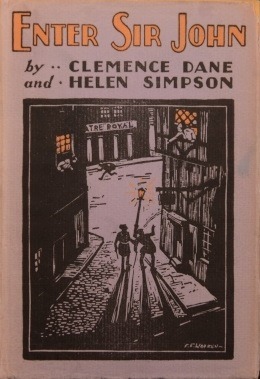
So I have been reading a LOT of random old timey detective fiction recently, and at one point made a reading list based on having read the fabulous The Golden Age of Murder by Martin Edwards, which I highly recommend to basically anyone with even the faintest interest in the subject (and even more so to Christie and Sayers fans). ANYWAY, I made the list, then completely forgot where I got it from, ordered a bunch of books through the NYPL's interlibrary loan system, and somehow got all of them at once. So now I have a stack of books from five states on my dresser, many of which are first editions. One of those is my copy of Enter Sir John by Clemence Dane and Helen Simpson, which isn't only a first edition but literally has the pencil inscription by the original owner from Christmas 1928, when he bought/received the book. Gah I love reading other people's old books.
Reading other people's old books in general is fun- reading this particular one was more of a mixed bag. The pacing was kind of weird, the mystery was kind of thin (and the motive was... PECULIAR for a 21st century reader, a mix of oddly progressive and deeply, deeply problematic depending on how you look at it), and the characterization of most of the characters was pretty thin. The atmosphere of the small-time theatrical setting was fun, and the detective, Sir John Saumarez, is reasonably entertaining. To go through, and mildly spoil (you'll see why shortly), the plot- someone is found dead who had been known to have previously quarrelled with a woman in the past, under circumstances which make it clear that this woman had both motive, means, and opportunity. The woman is arrested and her trial is attended by a man with a title who is struck by her and feels compelled to work on her behalf. He works hard to find the actual killer when the trial goes poorly for her, and realizes that he is in love with her and confesses his feelings to her.
Sound familiar?
For context, Enter Sir John was published two years before Dorothy L Sayers's Strong Poison, and to be transparent I fiddled a bit with the timing and phrasing to make the synopsis as CLEARLY correlated as it is (he doesn't confess his feelings to her until after he's gotten her off the murder charges, she's actually in the room when the murder victim is found, she actually is convicted and her conviction is overturned on appeal, among other changes). If the above plot sounds interesting and you HAVEN'T read Strong Poison, just skip and read Strong Poison because it does the whole thing SO much better. For one thing, the mystery is better- this was Dane and Simpson's first mystery, and while I largely enjoyed Dane's earlier novel Regiment of Women (which I may post my thoughts about sometime), this book just didn't really work for me. It's technically fair play, I guess, but there aren't a whole lot of actual suspects or clues (there aren't many suspects in Strong Poison either, but there are many more clues and there's a much more robust structure).
The other major difference, and this is pretty important because it's at exactly the point where the two books are so similar, is that the characterization of the romance in Enter Sir John is REALLY NOT GOOD. Sure, as Sayers noted in her 1929 introduction to her Omnibus of Crime anthology, love interests in detective novels are often shitty and this isn't necessarily significantly worse than certain others I have read. But while there do seem to be attempts to describe the suspect's personality in a way that makes her sound more honest, frank, straightforward, etc (the kinds of ways that Harriet Vane comes across later in Strong Poison), she also comes across really naive and dumb, and really doesn't have a whole lot to do in the book at all to counteract that impression. On the plus side... she isn't AS racist as some other people, I guess? (This plays into the motive, which I can describe in the comments for people- it's too annoying to get bogged down in.) But anyway, Sir John largely (apparently? it's not characterized super well) is compelled by her and falls in love with her because of her striking appearance and her good breeding and gentility or whatever, and it's all just super awkward. (Also, there's the same "oh no I didn't realize you were proposing" awkwardness in this book as in Regiment of Women, which does it MUCH better and for MUCH better characterization-related reasons. In this book it's just kind of skin-crawling to read.)
Anyway, why have I made you all read about why I didn't particularly like a not-super-easy-to-find book that you were unlikely to ever read anyway? Well, partly because it's an interesting curiosity- and because as I was reading I was like "what the hell, how did Sayers get away with this?" So I cracked open my copy of The Golden Age of Murder again and in its description of the book realized that it mentions that Sayers and Simpson were friends and that Enter Sir John is of interest as an inspiration to Strong Poison, which in retrospect is probably why I put it on my list in the first place.
But I'm still left with some lingering questions. While the actual murder plot and motive are entirely different, this particular throughline on the part of the detective is really STARTLINGLY similar, not least because Sir John Saumarez has some distinctive surface resemblances to Wimsey. For one thing, the method used to trap the killer (casually having them be part of a reenactment/discussion of the way the murder took place) is used by Sayers in Strong Poison as a ruse that Wimsey uses to try to catch Harriet Vane out, if there's anything to catch (when he "casually" brings up the murder-for-book-profits mystery plot idea he had). For another, like Wimsey later would in Strong Poison, Saumarez has a whole inner monologue about how he has only a month to solve the case (though in his case it's before the suspect is executed, and in Wimsey's case it's the IMO more plausible situation of being before the retrial occurs).
All that being considered, one major difference is, of course, that at the end of Strong Poison Wimsey and Harriet don't get engaged, and Saumarez and the suspect (whose name I don't even remember, if I'm being honest, she REALLY wasn't that memorable) do. But Sayers famously wrote that she wanted to use this book to marry Wimsey off! If she had followed through, and still used this same book as a way to do it, would she have literally lifted, if substantially improved, this plotline from her friend's book in order to do it? She was such an original writer- would she have borrowed so significantly from another writer to finish off a series that she had worked so hard on, even if it was one she was wearying of?!
It's interesting, because I wrote in a previous post about how it feels like after writing the Omnibus of Crime intro, including how bad mystery romance plots are, she dared herself to do it better. Reading this book makes me wonder if she read THIS PARTICULAR BOOK and decided she wanted to do it better. Which would be fascinating whether that was a decision that she made before she'd decided to continue the series after this book or afterward- before, in which case she'd be wholesale lifting the plot but at the same time elevating it lol I feel like I'm writing crossword clues) just by virtue of better writing and characterization in both that plot and the mystery that surrounded it, or after, in which case one of her ways of elevating it would de facto BE changing the ending to make it less corny and awkward, and writing a detective romance which is actually psychologically plausible and satisfying rather than just pairing pants and a skirt, so to speak.
Anyway- decidedly mediocre book that I don't particularly recommend, but one that made me ask some questions that I had a lot of fun pondering! I also had fun writing this, and am considering doing another one on Leo Bruce's The Case for Three Detectives, which was tremendously fun as a pastiche of Wimsey as well as Poirot and Father Brown.
#dorothy l sayers#lord peter wimsey#wimsey#harriet vane#enter sir john#clemence dane#helen simpson#classic mystery fiction#also worth noting- hitchcock directed an adaptation of this called murder!#i'm not especially excited about this#murder! is just what it's literally called#if you've seen it and it's any good let me know!
7 notes
·
View notes
Text
[antisemitism cw]
i'm listening to a quite decent audiobook of the first lord peter mystery, courtesy of lovely libby and the nypl, and it's mostly pretty good fun, if you discount the part where i'm very bad at focusing on audio without visual stimulus so i keep getting distracted and realizing i've missed a bit of it—but oof, i'd blotted out how gross this early book gets about jews!
“I remember so well the dreadful trouble there was about her marrying a Jew... they wouldn’t have minded so much if he’d pretended to be something else, like that Mr. Simons we met at Mrs. Porchester’s, who always tells everybody that he got his nose in Italy at the Renaissance, and claims to be descended somehow or other from La Bella Simonetta—so foolish, you know, dear—as if anybody believed it...”
like. what a perfectly impossible position to be in! you're meant to pretend to be something else, except that if you actually do, you won't succeed, and you'll earn mockery for having tried... sure sounds familiar!
and of course the really depressing part is that on the whole this is probably, like, a ““good”” version of antisemitism, in that it does at least condescendingly concede that some jews must be good people, and that it was probably ultimately for the best that this christian girl of ~good family~ married her jewish husband, if she was really fond of him...
#and like. this is coming from lord peter's mother who we're supposed to find charming#anyway i've of course heard worse but it's just like. every time i forget this stuff and every time it slaps me in the face all over again#or like. slaps people i love and value in the face but ultimately these sorts of attitudes are a slap in the face to all of our humanity#bookblogging#dorothy l. sayers#antisemitism#unfortunately i do like mysteries but like. time to go try isidore haiblum instead maybe??#or like. shira glassman or the very obvious michael chabon book#also apparently books categorized as 'jewish regency mystery' exist. presumably a wide net of quality here but. might poke my nose into some#(i do love living in the information age where when i say 'yiddish mysteries???' google says 'here you go!')#like i do think the rich characters in this early book are more of a send-up and less perfectly sympathetic than they later become#so it's i suppose possible that this is intended to be the sort of grossness even the nicest rich people inevitably engage in#hard to be sure without doing a whole deep dive into sayers' own attitudes which i'm not going to do right now#but the thing is that like. given how sympathetic lord peter and his mother both DO later become‚ it's awfully jarring to find this lurking#in the earliest version of her! and also all of this is assuming there isn't more of this that recurs later that i'm not remembering#which in all honesty doesn't feel like a particularly safe assumption#anyway. not really in the mood to go up a whole ladder about why this thing that feels shitty and bad might be excusable in some way#it's late and i'm leaving it at the very sophisticated take of: sux.
19 notes
·
View notes
Text
my inability to tell time might be hindering the writing of this murder mystery. forget rigor mortis, I’ve forgotten when February is and I don’t know how to count to 6
#used to read dorothy l sayers timetable mysteries and let them wash over me like a light rain#it’s especially funny considering I’m writing about a character who also canonically never knows what day it is. high five king
4 notes
·
View notes
Text
DEATH BY DISGUISE has a cover on its Goodreads page now!
#whitney and davies#death by disguise#fantasy books#mystery books#agatha christie inspired#dorothy l sayers inspired#diana wynne jones inspired#and weirdly#jane austen and elizabeth gaskell inspired#even though neither of them wrote mysteries or fantasies#but there you go
3 notes
·
View notes
Text

Currently reading: Strong Poison by Dorothy L. Sayers
Had a big test today; my brain is pudding and my bones are jelly. So chilling in bed with a mystery is about all the rest of the day holds for me
#strong poison#dorothy l. sayers#lord peter wimsey#books#book photography#currently reading#mystery#krimi
2 notes
·
View notes
Text
Whose Body?
Diving into my mom's beloved detective novels, I've rediscovered comfort in their pages. "Whose Body?" by Dorothy L. Sayers reignites my love for the genre's charm. 🕵️♂️💼 Join me in this cozy literary journey. #DetectiveNovels #CozyReads #BookLove
Britannophiles, unite!
Money wasn’t scarce growing up, but it also didn’t grow on trees. Movie theatres were a rarity: we waited until the release on VHS. The only “official” movies we had were gifts. Rarely, very rarely, we would rent a film from the local video rental shop – before it turned into a Blockbuster – but more often, we would borrow films from our favorite library. In order to be…
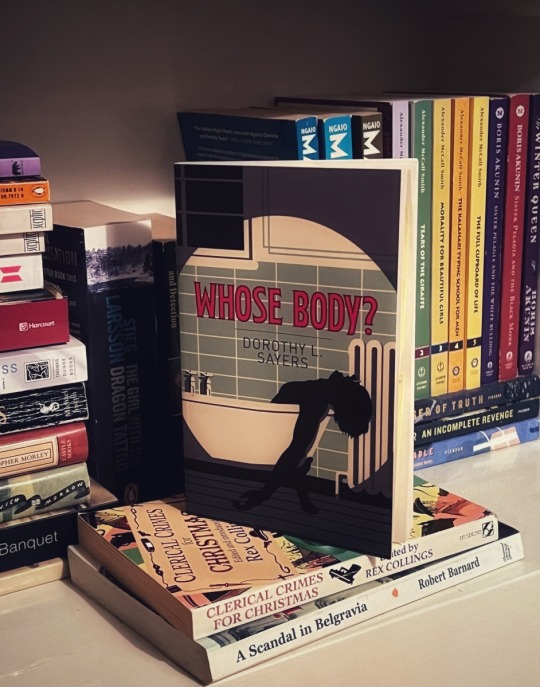
View On WordPress
0 notes
